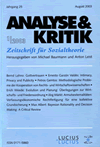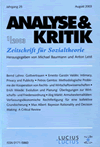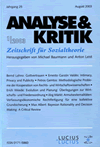Suchergebnisse
"Gregor Betz"
Titel: Meinungsdynamiken in fundamentalistischen Gruppen. Erklärungshypothesen auf der Basis von Simulationsmodellen
Autor: Michael Baurmann / Gregor Betz / Rainer Cramm
Seite: 61-102
Abstract: If we want to understand how fundamentalist group ideologies are established, we have to comprehend the social processes which form the basis of the emergence and distribution of such beliefs. In our paper we present an innovative approach to examining these processes and explaining how they function: with the method of computer-based simulation of opinion formation we develop heuristic explanatory models which help to generate new and interesting hypotheses. The focus is thereby not on individuals and their idiosyncrasies but on the dynamic mutual adaptation of beliefs in a group. These dynamics can produce an incremental establishment of ’charismatic’ opinion leaders and an increasing radicalization and alienation. A prototype of such a simulation model has produced promising first results which are presented and discussed.
Titel: What's the Worst Case? The Methodology of Possibilistic Prediction
Autor: Gregor Betz
Seite: 87-106
Abstract: Frank Knight (1921) famously distinguished the epistemic modes of certainty, risk, and uncertainty in order to characterize situations where deterministic, probabilistic or possibilistic foreknowledge is available. Because our probabilistic knowledge is limited, i.e. because many systems, e.g. the global climate, cannot be described and predicted probabilistically in a reliable way, Knight's third category, possibilistic foreknowledge, is not simply swept by the probabilistic mode. This raises the question how to justify possibilistic predictions including the identification of the worst case. The development of such a modal methodology is particularly vital with respect to predictions of climate change. I show that a methodological dilemma emerges when possibilistic predictions are framed in traditional terms and argue that a more nuanced conceptual framework, distinguishing different types of possibility, should be used in order to convey our uncertain knowledge about the future. The new conceptual scheme, however, questions the applicability of standard rules of rational decision-making, thus generating new challenges.

Aktuelle Themen der Soziologie I
2013 (35) Heft 2
Gastherausgeber: Ulrich Rosar
Editorial
Es ist erst drei Jahre her, da haben Christian Ganser und der tragischerweise viel zu früh verstorbene Norman Braun im 40. Jahrgang der SOZIOLOGIE, dem Mitteilungsblatt der Deutschen Gesellschaft für Soziologie, Ergebnisse einer empirischen Studie zum Wissenskanon des Faches Soziologie veröffentlicht: Fundamentale Erkenntnisse der Soziologie? Eine schriftliche Befragung von Professorinnen und Professoren der deutschen Soziologie und ihre Resultate, 2011, 151—174. Im Zentrum der Erhebun...

Aktuelle Themen der Soziologie II
2014 (36) Heft 1
Guest-Editor: Ulrich Rosar
Editorial
Es ist erst drei Jahre her, da haben Christian Ganser und der tragischerweise viel zu früh verstorbene Norman Braun im 40. Jahrgang der SOZIOLOGIE, dem Mitteilungsblatt der Deutschen Gesellschaft für Soziologie, Ergebnisse einer empirischen Studie zum Wissenskanon des Faches Soziologie veröffentlicht: Fundamentale Erkenntnisse der Soziologie? Eine schriftliche Befragung von Professorinnen und Professoren der deutschen Soziologie und ihre Resultate, 2011, 151—174. Im Zentrum der Erhebun...

Climate Change, Risk and Responsibility
2010 (32) Heft 1
Guest-Editor: Friedrich Breyer
Editorial
Global warming has arguably been the topic which has drawn the most attention both in the media and in academia and even in international politics over the first decade of the new millennium. Moreover, climate change is a typical field for interdisciplinary research: while natural scientists try to predict the impact of anthropogenic greenhouse gas emissions on average temperatures, climate events (such as floods, droughts and hurricanes) and sea-level rise over the next century and more, philos...